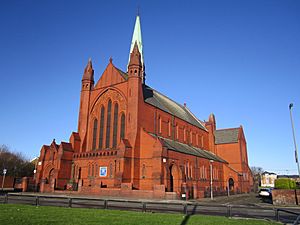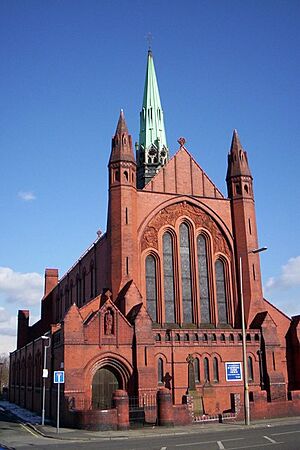Church of St Dunstan, Liverpool facts for kids
Quick facts for kids Church of St Dunstan, Liverpool |
|
|---|---|

Church of St Dunstan, Liverpool, from the southwest
|
|
| Lua error in Module:Location_map at line 420: attempt to index field 'wikibase' (a nil value). | |
| OS grid reference | SJ 374 895 |
| Location | Earle Road, Edge Hill, Liverpool |
| Country | England |
| Denomination | Anglican |
| Churchmanship | Liberal Catholic |
| Website | St Dunstan, Liverpool |
| History | |
| Status | Part of the Team Parish of St Luke in the City |
| Dedication | Saint Dunstan |
| Consecrated | 18 May 1889 |
| Architecture | |
| Functional status | Active |
| Heritage designation | Grade II* |
| Designated | 14 March 1975 |
| Architect(s) | Aldridge and Deacon |
| Architectural type | Church |
| Style | Gothic Revival |
| Groundbreaking | 1886 |
| Completed | 1889 |
| Specifications | |
| Materials | Brick, slate roof |
| Administration | |
| Parish | St. Luke in the City Team |
| Deanery | Toxteth and Wavertree |
| Archdeaconry | Liverpool |
| Diocese | Liverpool |
| Province | York |
The Church of St Dunstan is a beautiful old church located on Earle Road in Edge Hill, Liverpool, England. It is an active Anglican church, which means it belongs to the Church of England. St Dunstan's is part of a group of churches called the Team Parish of St Luke in the City. This church is very special because it is a Grade II* listed building. This means it is an important historic building that needs to be protected.
Contents
History of St Dunstan's Church
Building the Church (1886-1889)
The Church of St Dunstan was built a long time ago, between 1886 and 1889. Two architects, Charles Aldridge and Charles Deacon, designed it. The church was built for the family of Thomas Earle, who lived in the area. It was officially opened and blessed on May 18, 1889.
Changes Over Time
Over the years, the church has had some updates. In 1967, the inside of the church was changed to make it more modern for services. For example, an altar was moved into the main part of the church, called the nave. Also, the north chapel was enclosed with glass. More recently, in 2014, the church was updated again to better serve its community today.
Architecture and Design
Outside the Church
St Dunstan's Church is built with red Ruabon brick, which is a special type of brick. It has a roof made of slate. The church has a main area called the nave and smaller sections on the sides called aisles. There are also two porches, one on the north side and one on the south.
Near the front of the church, there is a tall, pointed tower-like structure called a flèche. It is covered in copper and has openings for bells. At the very front, there is a special area for baptisms called a baptistry. Above the main entrance, you can see five tall, narrow windows called lancets. On either side of these windows are tall, eight-sided towers with pointed roofs.
Look closely above the windows, and you'll see carvings of symbols representing the Evangelists (Matthew, Mark, Luke, and John), along with a figure of Christ. Along the sides of the church, there are many more lancet windows. Above the north porch, there's a detailed pattern called diapering and a statue of Saint Dunstan in a special carved space called a niche.
Inside the Church
When you step inside St Dunstan's, you'll notice the tall arches that separate the main nave from the aisles. These arches are supported by round stone pillars. Above the arches, there is a decorative band called a frieze. Most of the inside walls are made of brick, matching the outside.
Some important features inside were designed by Charles Deacon, one of the architects. These include the beautiful alabaster reredos (a decorated screen behind the altar) and the wrought iron lectern (where readings are given). There is also an iron screen between the nave and the chancel (the area near the altar).
You can also find brass plaques inside the church. These are special memorials to members of the Earle family, who helped build the church. The large window at the front of the church has amazing stained glass made by artists named Burlison and Grylls. The church also has a large pipe organ that was built around 1880 by Henry Willis. Sadly, by 2002, the organ was no longer working.
Experts have described the church's design as "severe but handsome." The front of the church is considered "impressive if rather curious." The inside of the church is known for its "gloomy atmosphere," which can make it feel very grand and historic.
St Dunstan's Today
As of 2015, St Dunstan's Church continues to be an active place of worship. Services are held every Sunday morning, welcoming everyone. The church remains an important part of the Edge Hill community in Liverpool.
See also
- Grade II* listed buildings in Merseyside
 | Madam C. J. Walker |
 | Janet Emerson Bashen |
 | Annie Turnbo Malone |
 | Maggie L. Walker |


